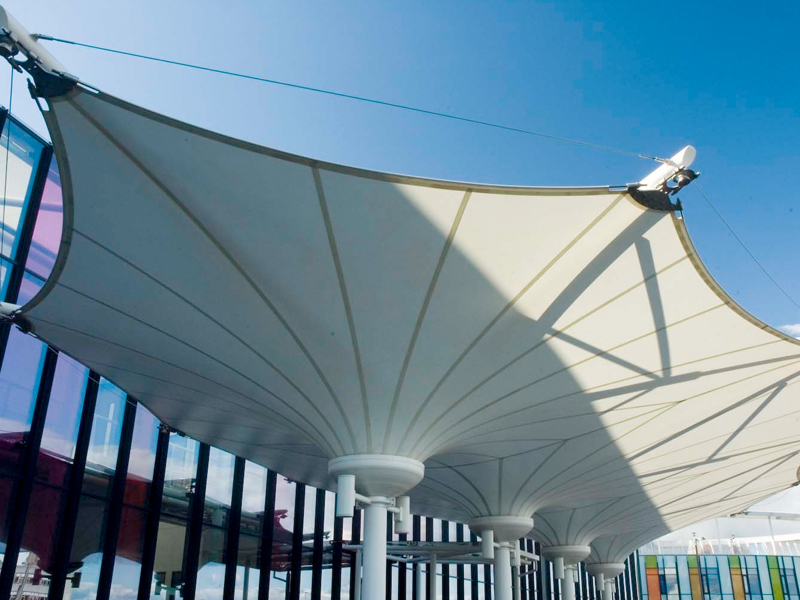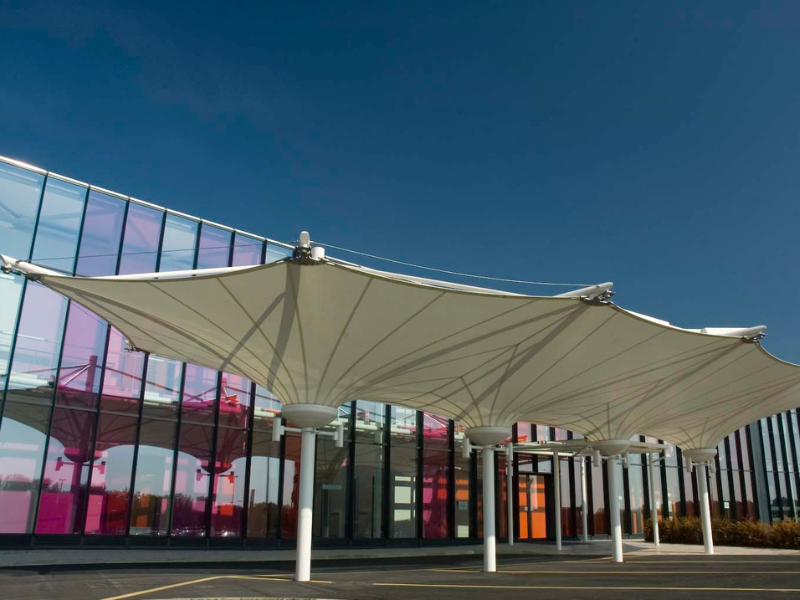
How to Choose a Reputable Tensile Fabric Structure Manufacturer

When investing in a tensile structure, you want to be certain the contractor you pick to undertake your project is qualified, trustworthy and committed to excellence. However, knowing how to determine these qualities can be difficult. To help, we’ve taken a look at the top considerations you need to make when choosing a reputable manufacturer.
Get a Second Opinion
A great place to start when selecting a fabric architecture manufacturer for your project is to ask for a testimonial from one of their previous clients. Their experience will tell you a lot about whether the manufacturer’s skills and customer service match your expectations and requirements. Even better, view an installation in person and talk to the owners directly.
Alternatively, carry out a site visit to the manufacturer’s premises. This will give you a good idea as to whether their work meets your standards. Ask them if they manufacture the product themselves, and if not, find out who the sub-contractor is and check them out too.
Check Financial Stability
Use Companies House to find out more information about the proposed supplier. Check that they’re filing their accounts on time and for any strike off notices or insolvencies, asking your accountant to do the same if you’re in doubt. It’s also worth investigating the directors and looking at any associated companies they may be involved with, especially if there are a number which have been dissolved. Find out if the supplier is solvent and if they have the financial resources to undertake your project.
Insurance and Compliance
Before agreeing to go ahead with your project, you want to be confident that in the event of something going wrong, both yourself and the contractor are covered for any damages or losses. In today’s market, tensile fabric structure manufacturers should hold at least £10m worth of employee, public and product liability insurance. Furthermore, they or their structural engineers should have professional indemnity insurance, and contractor all risks insurance is a must for site works.
When it comes to compliance, ensure the contractor adheres to and provides certifications for the relevant standards being used to design, engineer, manufacture and install your tensile structure. At no extra cost, you should expect to receive fire certificates, warranties, insurances and engineering calculations and drawings compiled into an operations and maintenance manual for you to review.
Associations and Health and Safety
All professional contractors should be members of a trade association. For the fabric architecture branch of the business, J & J Carter maintain membership with the IFAI and MUTA. One of our co-owners, Robert Carter, serves on the executive committee of the latter.
Moreover, a reputable contractor will have a health and safety policy in place (as well as safe systems of work) and evidence this to clients. These days, most clients will also require the manufacturer to be accredited. At a minimum, this should involve being a CHAS or ConstructionLine member. ConstructionLine will vet the manufacturer’s quality, insurance, financials, health and safety and environmental credentials.
Cross-check for Quality
It’s all well and good being certified against ISO9001 for quality assurance, but as your tensile structure will involve a steel and or aluminium frame, the fabricator must also be UKCA approved. This means they’re audited annually to EN1090 (minimum Execution Class 2). Their welders must be coded for the work they do, and they must have a factory control system in place to ensure effective materials traceability. Ask to see their certificates.
Regarding supply chain, any good contractor will inform you of the full details of the structure when they quote (including the name of the fabric supplier). They should be proud of who their supplier is, after all, the fabric warranty will be assigned to the client, so they should know in advance who they’re potentially working with. Talk with the supplier to get their feedback on their client and confirm whether the fabric you’ve been promised is the material that’ll be delivered.
Price and After Sales Service
Like most things, the cheapest price your tensile structure project can be completed for is not necessarily the one that represents the best value for money. In fact, if you have three prices, invariably it will be the middle price which represents fairest value. Don’t forget that additional value may be provided in post-installation maintenance. Inevitably, your tensile structure will need cleaning and re-tensioning, activities that require specially trained personnel. To preserve a warranty, a maintenance programme is required.
Why Choose J & J Carter?
At J & J Carter, we pride ourselves on being open and honest about the quality of our materials, insurance policies and financial resources. This, along with the great relationship we create with our clients and suppliers, means we are a leading and reputable tensile fabric structure manufacturer. We’ve won multiple awards throughout our 33-year history and are accredited by several safety bodies, including ConstructionLine, UKCA and CHAS. We welcome any questions you may have about our policies or fabric architecture solutions. Contact us today for more information.


